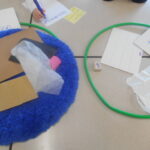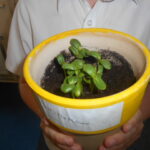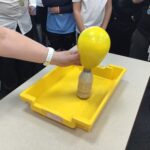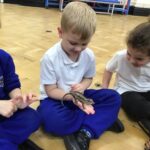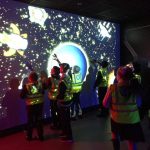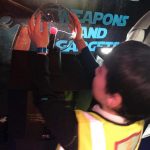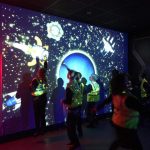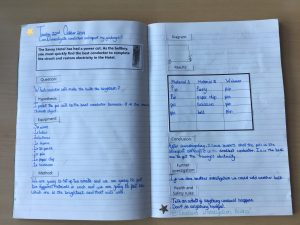Science
What does Science look like at Leamington?
At Leamington Community Primary School, we are enthusiastic about Science! We are nurturing our children’s natural wonders as we watch our future scientists blossom before our eyes. We aim to teach Science in a fun, engaging and motivating way that provides ample opportunities and learning experiences for children to enhance their Science capital. From an early age, children are inquisitive about the world they live in; we aim to foster this curiosity and encourage children to ask questions and seek answers. Our vision is to instil a profound love for science within the hearts of our children, empowering them to dream boundlessly. We aspire for them to envision futures as biologists, doctors, vets, astronauts and zoologists and we strive to inspire their ambitions. The sky is the limit!
Intent
We believe in encouraging the curious mind and enhancing the boundless thoughts and creativity of our children. Young minds are engines of innovation, constantly formulating new ideas, observing their impact, and naturally putting them to the test. At the heart of our educational philosophy is the recognition that children’s concepts blossom through hands-on exploration. Our immersive curriculum is a testament to this philosophy, providing real-life opportunities for children to dive into purposeful activities that vividly illustrate how science functions in the real world. We develop independent and resilient thinkers with ambition and foresight. Our Science curriculum serves as a catalyst for inspired thinking and collaborative learning. We firmly believe that ‘together, we make a difference’ . To deliver on this, children will complete a wide range scientific enquiries, in groups, whilst developing the ability to share knowledge and report on findings in their group-based jotters. To deepen the Scientific learning experience, we use the ‘Developing Experts’ scheme to further enhance our curriculum through engaging and inspiring lessons, enriching the minds of our students with a deeper understanding of the world around them.
Primary Science focuses on the development of knowledge and understanding of scientific objectives, whilst developing scientific skills that draw upon the natural interests and abilities of children. Our pupils are given opportunities to observe, investigate, experiment, discover and communicate their ideas in a variety of ways enabling them to learn about the way things are and why they behave as they do. We have designed an ambitious curriculum to provide children with the knowledge and cultural capital they need to succeed in the world. We strive to deliver the foundations of skills, attitudes, knowledge and understanding that will enable all of our children to understand the world around them. Our curriculum is planned and sequenced to combine sufficient knowledge and skills for future learning and employment. We aim to inspire our future thinkers, innovators and problems solvers. Every child is a scientist and we encourage children to explore their natural wonders while promoting a love of science. We aim to provide a broad and balanced curriculum across key stages.
Documentation:
Primary National Curriculum – Science
Implement
The Developing Experts scheme is well-sequenced to ensure logical and natural progression across units. Children are taught the national curriculum objectives for each year group, whilst working scientifically skills progress across key phases.
Knowledge, Understanding and Skills
We believe that science should be taken outside of the classroom to enhance lessons and that it is not solely about what happens in the classroom. It is about the added value and experiences we offer to truly inspire our children; a combination of real-life experiences united with engaging classroom lessons that motivate children and encourage our future scientists. Our goal is to inspire our students to explore the way the world functions around us. Enriching our children’s time at our school with memorable and unforgettable experiences, whilst supporting and developing their scientific skills, knowledge and understanding of the world, is a quality that we value.
Impact
Staff use summative and formative assessment throughout each science topic. Teachers use this data to prepare short-term planning and adapt lessons to ensure all learners’ needs are met, from supporting children with SEN to challenging more able children.
Staff use ‘Knowledge, Understanding and Skills’ assessment sheets to identify children in each year group as either ‘Working towards’, ‘Expected’ or ‘Greater Depth’. For each topic, staff will complete this assessment sheet for curriculum objectives for each year group. The ‘Working Scientifically’ assessment sheet will be used throughout the year to with each different topic.
At the end of each topic, children are given the chance to reflect on their learning and demonstrate their knowledge and understanding of Science in a variety of ways. Our reflection tasks are an excellent way of assessing children’s understanding of the topic. Tasks include a range of investigations, reports, practical activities and provide children with a chance to demonstrate their working scientifically skills.
Science Reflection Tasks
Each reflection task is purposefully planned with real-life links to allow children to showcase their knowledge and understanding for each topic.
Supporting SEND in Science
At Leamington, all our Science lessons are planned to be inclusive for all, our teachers anticipate what barriers are present for the children when taking part and learning in Science. We foster children’s natural wonders about the world and plan lessons to reduce barriers to learning for children with SEND, allowing all children to achieve their full potential.
In some activities, children with SEND will access lessons in the same way as their peers. In others, some modifications or adjustments are made to include everyone. Ways in which we adapt certain lessons for our children are by providing visuals for instructions to experiments, rather than written instructions or using a video simulation of a process rather than manipulating equipment. Questions are prepared in different styles and levels for different children; considerate planning and preparation ensures all of the children at Leamington have the opportunity to answer open-ended questions and take part in all scientific enquiries. Providing alternative methods of recording for science also ensures that writing does not become a barrier to learning and achieving desired outcomes. Occasionally, children with SEND will have to work on different activities tailored to meet their needs, however they are always given opportunities to initiate and direct projects and are valued as equal contributors in their class.
Supporting Mental Health in Science
We understand the importance of maintaining positive Mental Health in all of our children. During our Science lessons, we ensure that we establish a safe and secure environment so children are ready to learn.
Within our Science lessons we encourage the children to talk about their own scientific interests. This could be something that helps encourage their independence such as completing an experiment correctly or setting up a research project about a famous scientist or inventor. We believe that when children feel they are contributing to a Science lesson and their own learning, it can enhance their sense of belonging and positive thoughts.
Whatever the learning intention, it is important that children understand they can always improve and develop their skills and abilities, particularly in Science. Science can often be about trial and error, or involve repeating investigations and comparing results. We all make mistakes – this is how we learn. This is often referred to as a ‘growth mind set’; we discuss how we all have the ability to change the way we think and do things. So, whether a child is learning how friction works or is setting up their own electrical circuit, our teachers talk to children about their learning in a positive manner which influences the children’s work and their own beliefs and attitudes towards Science.

